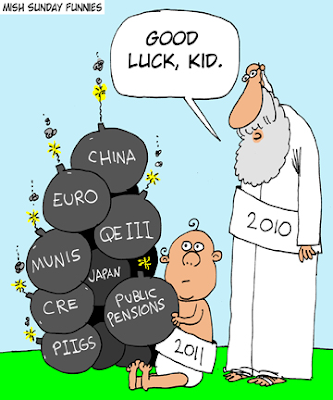Mish's Global Economic Trend Analysis |
- Factories Expand 17 Consecutive Months, Jobs Don't
- Uniquely Dysfunctional Relationships; Short and Long-Term Solutions to the Public Union Pension Crisis
- The Consumer Becomes "The Consumed"
| Factories Expand 17 Consecutive Months, Jobs Don't Posted: 03 Jan 2011 01:13 PM PST The latest ISM reports show Factories grow for 17th straight month in December. Manufacturers produced more goods and booked more orders last month, leading to the fastest growth in factory activity since May.Manufacturing Employment The BLS Current Statistics report shows November lost 13,000 jobs, October 11,000 jobs, September 6,000 jobs and August 26,000 jobs. click on any chart below to see a sharper image  In spite of 17 consecutive months of manufacturing expansion, hiring was only up 7 of those months, and not once in the last 4. Manufacturing Long-Term Trends  The long-term trend suggests it would be a mistake to expect too many jobs out of manufacturing. For more about jobs please see Jobs Forecast 2011 Calculated Risk vs. Mish The BLS report for December comes out on January 7th. The January report comes out on February 4th. Those reports could be robust because of retail and service sector hiring, especially the January report. Normally there are a lot of layoffs in January for obvious seasonal reasons. However, some of the recent hiring by stores might be permanent. If so, some expected layoff may not happen and we could see a couple of really nice looking jobs reports. However, it would be a mistake to think that stores are going to keep hiring at a brisk pace all year simply because a couple of months look good. Headwinds are enormous and the mess states face is not accounted for. We are not going to spend our way back to prosperity regardless of what Keynesian clowns may think. Mike "Mish" Shedlock http://globaleconomicanalysis.blogspot.com Click Here To Scroll Thru My Recent Post List |
| Posted: 03 Jan 2011 09:48 AM PST "Uniquely Dysfunctional" is an apt description of the relationship between public unions and the corrupt politicians in bed with those unions. The term comes from Fred Siegel, a historian at the Manhattan Institute. I found the term in Public Workers Face Outrage as Budget Crises Grow. Ever since Marie Corfield's confrontation with Gov. Chris Christie this fall over the state's education cuts became a YouTube classic, she has received a stream of vituperative e-mails and Facebook postings.Among the freeloading freeloaders are the cowards like the retired undercover police officer refusing to give their name to the New York Times. I would like to see that person's name and their pension payment posted in the article. One would think that New Jersey teachers might have the ability to learn. However, judging from repeated powder puff softball questions by teachers that governor Chris Christie can hit out of the ballpark, I have to wonder. Marie Corfield got what she deserved. Check it out in case you think otherwise. Governor Chris Christie was straight, direct, and correct in his response to a union teacher in New Jersey who complains about teacher layoffs. Clearly the teacher's union is to blame. Moreover, it is the same in every state. How teachers cannot see this is a wonder to behold. For all I know, Marie Corfield is a hard working teacher. However, I can make a case we do not need to teach art at all, and on that basis she should be fired tomorrow. However, the merits of teaching art is not the point. The point is her amazing sense of entitlement as to what her job is worth as a teacher in general. The same applies even more so to police and fire workers whose pensions are generally larger. Bankruptcy Solution One possible solution to this madness in my opinion is bankruptcy. In bankruptcy, the teachers and fire fighters and police can see just what a judge thinks they are worth. My point being, you cannot pay money that is not there. In many case, city finances are so far gone that bankruptcy is the only option Amazing Sense of Entitlement Taxpayers are angry and for good reason. Many do not have the "problem" Marie Corfield bitches about because their problem is worse, no job at all. While Corfield whines about having to pay $750 dollars a year for family health, dental, and eye-care (for life), most pay far more for far less. Many have no benefits at all. Where this insane sense of entitlement come? The only possible answer is the union itself. Private workers certainly do not have the same sense of "taxpayers owe me" entitlement that public union members have. That entitlement comes from being part of a union "mob". These public union-politician "dysfunctional relationships" are fraudulent precisely because there is "no natural adversary", no one looking out for taxpayer interests. Short and Long-Term Solutions The long-term solution is the end of collective bargaining for public unions, and indeed the total abolishment of public unions in general. Unfortunately that does not rectify the ill-gotten gains of public union workers, notably police and fire workers who often retire at age 55 with 80-90% of salary and take another job in the meantime. The short-term solution to this mess is to tax all public union pension benefits before the age of 62 at 90% , and after the age of 62, tax public union pensions in excess of a certain amount at a very high rate. I propose these taxes be collected upfront, taken out of retirement checks and the money collected be fed back into public union pension plans to make them solvent. The beauty of my proposal is it could win support of many public union workers who do not have excessive benefits and who might be totally screwed in bankruptcy. Mike "Mish" Shedlock http://globaleconomicanalysis.blogspot.com Click Here To Scroll Thru My Recent Post List |
| The Consumer Becomes "The Consumed" Posted: 03 Jan 2011 01:46 AM PST Following is one of the more fascinating emails I have ever received. It is from reader Sally Odland who every year partakes in a "different ritual" celebration on New Year's Eve, a tradition she picked up on a trip to Ecuador. Sally writes ... Dear Mish,click on any image for a sharper view      I feel obliged to point out the exceptionally funny fine print "Once In A Lifetime" just above the words "Twice Yearly Sale" in the second and third photos. Sally Writes ... Effigy was collaborative montage assembled - literally - at the 11th hour by me, my husband Bruce, sons Max and Michael and Max's girlfriend Susannah. My sons laid the fire. Photos shot by Bruce.The Trolley Problem Please consider the New York Times article Philippa Foot, Renowned Philosopher, Dies at 90 Philippa Foot, a philosopher who argued that moral judgments have a rational basis, and who introduced the renowned ethical thought experiment known as the Trolley Problem, died at her home in Oxford, England, on Oct. 3, her 90th birthday.Global Progression of "Being Consumed By Consumption" Philosophical pontifications aside, it is fascinating to watch the global progression of "Being Consumed By Consumption". The property bubble in the US, Ireland, and Spain took its toll. Yet, "It's Different Here" thinking runs deep in Australia, Canada, and China. It's not different anywhere. Once home prices exceed people's ability to pay for them and/or home prices exceed the cost of renting, crashes are all but inevitable. I do not care what commodity prices are or how many people allegedly want to move someplace (think Miami, Phoenix, Las Vegas, Vancouver, Sydney, Shanghai), home prices exceeding rental prices or wage growth by multiple standard deviations is a sign of a bubble that will pop. Miami, Phoenix, and Las Vegas have seen crashes. So will Vancouver, Sydney, and Shanghai. Indeed, the longer the delay, the bigger the crash. The warning signs of over-consumption in Australia, Canada, the UK, and China are flashing red. However, it's far to late to do anything about them. The interest rate match has been lit in Australia and China, but it is irrelevant. Interest rates hikes or not, global property bubbles and consumerism in general are going up in flames just as the trash of reader Sally Odland did at the stroke of midnight on new year's eve. Happy New Year  For a look at problems for the new year, please see Ten Economic and Investment Themes for 2011 Mike "Mish" Shedlock http://globaleconomicanalysis.blogspot.com Click Here To Scroll Thru My Recent Post List |
| You are subscribed to email updates from Mish's Global Economic Trend Analysis To stop receiving these emails, you may unsubscribe now. | Email delivery powered by Google |
| Google Inc., 20 West Kinzie, Chicago IL USA 60610 | |

No comments:
Post a Comment